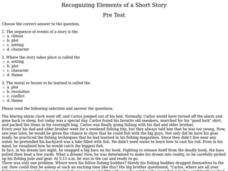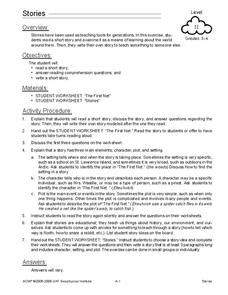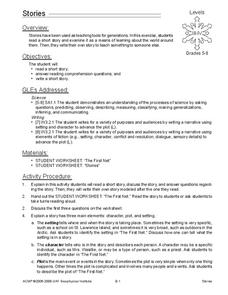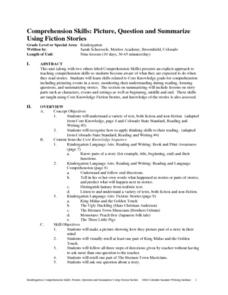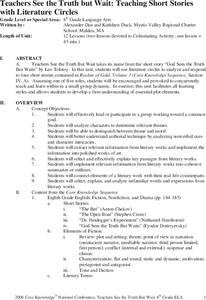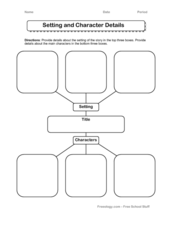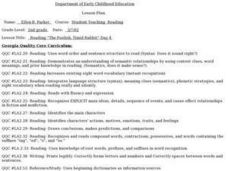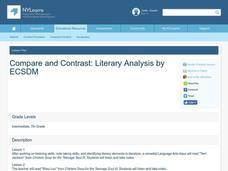Curated OER
Elements of a Story
Fifth graders use text to identify the elements of a story. They compare and contrast the elements and explain them to the class. They discover why each element is needed to make a good story.
Curated OER
Recognizing Elements of a Short Story
For this elements of a short story worksheet, middle schoolers are given definitions and must choose the element being defined. Students are also given a selection to read and answer questions about.
Curated OER
Egg Carton Stories
Students create stories with better structure when they are able to focus on its characters, setting, and plot. Teacher creates settings, character, and problem cartons with information written on strips of paper.
Curated OER
Stories
Young scholars read a short story and answer questions. For this comprehension lesson, students read a short story and complete a worksheet answering comprehension questions and identifying the parts of a story. Young scholars...
Curated OER
Stories
Learners read and write a short story. In this short story lesson plan, students read a short story and answer comprehension questions on it that teaches them about the world around them. Then they write a short story to teach...
Curated OER
Imagining Your Science Fiction Short Story
Twelfth graders brainstorm ideas for their own science fiction story. Using worksheets, they sketch the plot and setting for their story. They create appropriate characters and develop their interactions among each other. They share...
Curated OER
Reviewing Literary Elements
Students identify the elements of fiction, and work on compare and contrast skills.. In this comprehension lesson, students read different versions of Cinderella. Students use a Venn diagram to compare and contrast the literary elements...
Curated OER
Parts of a Story
Students read a short fiction book and demostrate comprehension by identifying the main characters, setting, conflict, theme, and summarizing the main points. They organize the information in Inspiration and create a powerpoint to show...
Curated OER
Comprehension Skills: Picture, Question and Summarize Using Fiction Stories
Students build a variety of comprehension skills through the nine lessons of this unit. Picturing events, monitoring understanding during reading, forming questions, and summarizing stories form the core of the lessons being taught...
Curated OER
Identifing Elements of Narrative Writing
Learners explore the concepts of narrative writing. They identify the basic elements in narrative writing such as the setting description, characters, conflict, climax and resolution. Using five adjectives from a previous spelling unit,...
Curated OER
Reading Short Stories
In this graphic organizer worksheet, students fill in the graphic organizer with the predictions, settings, characters, background, and more for short stories. Students complete 5 sections.
Curated OER
Is there a map in that story?
Eighth graders examine different pieces of literature from specific isolated Pacific islands. In this Geography instructional activity, 8th graders read and interpret a written selection. Students construct a map of the stories setting.
Curated OER
Making a Magical Story
Students create their own magical story. In this story writing lesson, students listen to the story The Lion, The Witch, and the Wardrobe b C.S. Lewis to find the basic elements of a story. They come up with their own magical...
Curated OER
Analysis of Character in a Short Story
Ninth graders examine a character from the short story, John Steinbeck's, "Flight." students respond to questions about the story and illustrate the character's journey.
Curated OER
Teachers See the Truth but Wait: Teaching Short Stories with Literature Circles
Students use literature circles to analyze four short stories from the Realms of Gold, Volume 3. In this literature circle lesson, students are assigned a role in the literature circle to improve their critical thinking skills for...
Curated OER
Developing a Story Plan
In this developing a story plan worksheet, students describe each of the three parts of their story. Students create an opening, sequence of events, and a closing.
Curated OER
Setting and Character Details
In this setting and character worksheet, students provide details about the setting and character in this graphic organizer. Students provide 3 details for each.
Curated OER
STORY MAPPING: THE HUNDRED DRESSES
Students illustrate and paraphrase each chapter of The Hundred Dresses, creating a graphic organizer through the use of story mapping. After students have completed their story maps, ask for a few volunteers to present theirs to the class.
Curated OER
Analyzing Story Structure
Pupils explore language arts by completing a graphic organizer in class. For this story structure lesson, students read the poem "Sick" by Shel Silverstein and discuss the different elements in the piece which make it an effective...
Curated OER
Story Writing
Young scholars work in groups to create a story that will be presented to the class. In this story writing activity, students complete a project planning sheet, work together to create a story that includes a hero and at least two...
Curated OER
In Search of Self: Adolescent Themes in the Twentieth Century Short Story
Students read short stories that are related to adolescent issues and behaviors. In groups, they review the elements of a short story and vocabulary they might need while reading. To end the lesson, they read "Sir Tatton Sykes"...
Curated OER
Language Arts: Plotting Stories
Second graders read the story, "The Foolish, Timid Rabbit," as part of a unit on appearances. After reading with partners, they write their own stories that include elements about some forms of matter from their science studies. Students...
Curated OER
Stories of Hope: Dragonfly and Mosquito
Students identify and interpret the value of the dragonfly as a predator of the mosquito. They create their own folktales using the dragonfly or a creature of their choice to solve the malaria problem or another issue. Students also...
Curated OER
Compare and Contrast: Literary Analysis
Seventh graders are able to use active listening skills, take notes and identify literary elements of a short story. They use/create graphic organizer, compare/contrast literary elements from various stories and compare and contrast traits.

